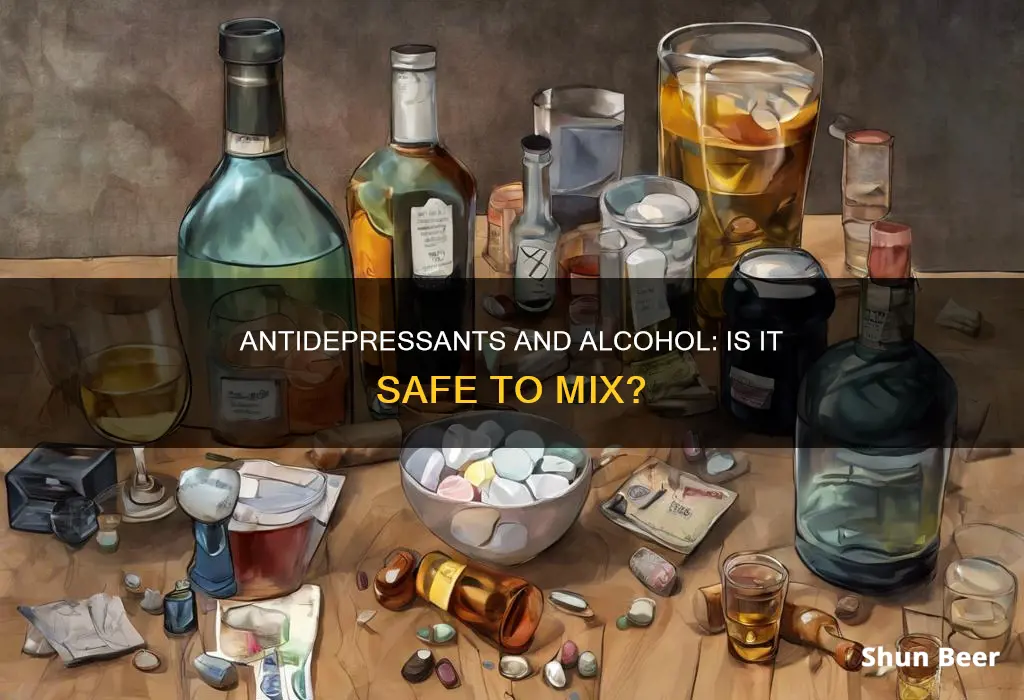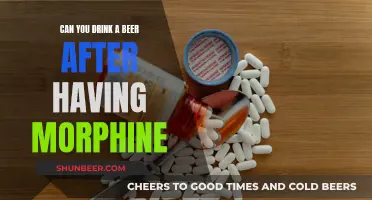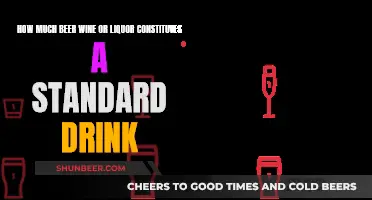
Drinking alcohol while taking antidepressants is not recommended. While it may not always be dangerous, it can cause a range of side effects, from drowsiness to violent behaviour. It can also reduce the effectiveness of the medication and increase the risk of overdose. In extreme cases, it can even be fatal.
| Characteristics | Values |
|---|---|
| Is it safe to drink beer while taking anti-depressants? | No, it is not safe to drink alcohol while taking anti-depressants. |
| Why? | Alcohol can worsen symptoms of depression, making them more difficult to treat. It can also increase the risk of and worsen side effects, such as drowsiness or dizziness, as well as increase the risk of overdose. |
| What are anti-depressants? | Anti-depressants are medications that are commonly prescribed to treat depression, but they are also sometimes used to treat other conditions, such as obsessive-compulsive disorder, generalized anxiety disorder, post-traumatic stress disorder, or certain types of chronic pain. |
| What are the types of anti-depressants? | Selective Serotonin Reuptake Inhibitors (SSRIs), Tricyclic Antidepressants (TCAs), Monoamine-Oxidase Inhibitors (MAOIs), Serotonin-Noradrenaline Reuptake Inhibitors (SNRIs), Norepinephrine-Dopamine Reuptake Inhibitors, Noradrenaline and Specific Serotonergic Antidepressants. |
| What are the side effects of anti-depressants? | Headaches, nausea, restlessness, sleep disturbances, and sexual issues. |
What You'll Learn
- Drinking while on antidepressants can worsen symptoms of depression
- Alcohol and antidepressants can cause dangerous spikes in blood pressure
- Mixing the two can increase the risk of overdose
- Alcohol can make antidepressants less effective
- Drinking while on antidepressants can increase the risk of addiction

Drinking while on antidepressants can worsen symptoms of depression
Drinking while taking antidepressants can worsen symptoms of depression. Alcohol is a depressant that can cause your problems to seem worse than they are and make you feel more depressed. It can also enhance the severity and duration of many common depression symptoms, including fatigue, decreased energy, feelings of guilt, worthlessness, or helplessness, difficulty concentrating, remembering details, and making decisions, feelings of hopelessness and/or pessimism, insomnia or excessive sleeping, irritability, restlessness, overeating or appetite loss, persistent aches or pains, headaches, cramps, or digestive problems.
Alcohol can also lower serotonin and norepinephrine levels, which help regulate mood. Lower levels of these chemicals can make a depressed person feel even more depressed. Additionally, alcohol temporarily cuts off the effects of stress hormones, which can exaggerate depression symptoms because it depresses the brain and nervous system.
Drinking while on antidepressants can also lead to more severe side effects from the medication, including muscle aches, joint pain, reduced ability to clot blood, and increased drowsiness. It can also alter your thinking and judgment, leading to poor decisions and potentially dangerous behaviour.
Furthermore, people with depression who drink heavily are more likely to have frequent and severe episodes of depression and are at an increased risk of developing a substance use disorder. They may also find that alcohol makes their antidepressant medication less effective.
Beer Drinking in IMAX Moore: What's Allowed?
You may want to see also

Alcohol and antidepressants can cause dangerous spikes in blood pressure
Drinking alcohol while taking antidepressants is not recommended, as it can cause a host of issues, including intensifying feelings of depression and increasing the risk of overdose. One of the most serious risks, however, is the potential for dangerous spikes in blood pressure, which can have fatal consequences.
Monoamine Oxidase Inhibitors (MAOIs) are a type of antidepressant that works by interfering with the enzymes in the brain that clear out "feel-good" chemicals like serotonin and norepinephrine. MAOIs are older medications that are less commonly prescribed due to the risk of adverse drug interactions and severe side effects. However, they may be prescribed if other antidepressants have proven ineffective.
When MAOIs are combined with alcohol, the results can be life-threatening. MAOIs increase levels of tyramine, an amino acid, in the body. Tyramine is also found in certain foods and drinks, including beer and wine. Excess tyramine can lead to a dangerous spike in blood pressure, which may require immediate medical attention and can even be fatal.
The combination of MAOIs and alcohol can also increase the risk of a hypertensive stroke. This occurs when high blood pressure damages the blood vessels in the brain, causing them to rupture or leak. The effects of a hypertensive stroke can include severe headaches, nausea, vomiting, altered mental state, and loss of coordination.
To avoid these dangerous spikes in blood pressure, it is crucial to avoid consuming alcohol while taking MAOIs. If you are taking antidepressants, it is important to discuss your alcohol consumption with your doctor, as it could negatively impact the effectiveness of your medication and introduce other health risks. Abruptly quitting alcohol can also be dangerous, so it is important to seek professional advice before making any changes.
Beer: A Friend or Foe for Passing Kidney Stones?
You may want to see also

Mixing the two can increase the risk of overdose
Drinking alcohol while taking antidepressants can increase the risk of overdose. This is because both substances have an effect on the brain. Alcohol is a neurological suppressant, inhibiting neurotransmitter exchanges in the brain. This is why people often have trouble thinking and performing other tasks when they have been drinking. Antidepressants are tools that manipulate the chemical balance in the brain, altering the levels of neurotransmitters like serotonin. When combined, alcohol and antidepressants can create a harmful effect in the brain, as prescription medication is not meant to be altered by other substances.
The combination of alcohol and antidepressants can also increase the risk of and worsen side effects, such as drowsiness or dizziness. This is particularly true of selective serotonin reuptake inhibitors (SSRIs), which are the most commonly prescribed type of antidepressant. SSRIs include medications like fluoxetine (Prozac), paroxetine (Paxil), citalopram (Celexa), and sertraline (Zoloft). The risk of drowsiness is higher if you take larger doses of SSRIs, but these medications can cause drowsiness at any dosage. Alcohol can also cause sedation and may enhance these effects. That means if you mix alcohol and SSRIs, you may experience drowsiness more quickly than someone who drinks the same amount of alcohol but doesn't take SSRIs.
Mixing alcohol and antidepressants can also lead to more serious health risks that require emergency medical attention. At best, it leads to minor reductions in the effectiveness of the medication. At worst, it can be fatal. Not only does alcohol change the way antidepressants work, making them potentially less effective, but it could also increase suicidality in connection with worsened depression. Alcohol can make all of the following symptoms of depression worse:
- Feelings of worthlessness
- Tiredness or insomnia (trouble falling or staying asleep)
- Weight gain or weight loss
If you are taking antidepressants while drinking, you should discuss your alcohol use with your doctor or another healthcare professional. In many cases, addressing the alcohol abuse problem and stopping drinking altogether may be necessary to effectively manage your mental health and reduce the likelihood of increased mental and physical health issues. However, this should be discussed in detail with a medical professional, as abruptly quitting drinking can result in a dangerous withdrawal syndrome in some individuals.
Beer and Eliquis: Safe Mix or Health Risk?
You may want to see also

Alcohol can make antidepressants less effective
Firstly, alcohol can worsen depression symptoms and increase the frequency and severity of depressed moods. It can trigger a relapse, even when depression is otherwise under control. Alcohol is a poor coping mechanism that does not address the root cause of difficult emotions. Only professional treatment and healthy coping strategies can truly help process feelings and moods and manage depression in the long run.
Secondly, people with depression are at a greater risk of developing a substance use disorder. According to experts, the risk is double compared to those without depression. While co-occurring mental illnesses and substance use disorders are treatable, management for a dual diagnosis is much more challenging. If you drink and develop an addiction, it will become harder to control depression symptoms, reduce the frequency of episodes, and stop or moderate drinking.
Thirdly, alcohol can enhance and worsen the side effects of antidepressants. Selective serotonin reuptake inhibitors (SSRIs), the most common class of antidepressants, may cause muscle aches, joint pain, a reduced ability to clot blood, and other uncomfortable or severe side effects. Alcohol may increase the number and severity of these side effects, and some of these side effects can be dangerous and detrimental to your health. Additionally, as side effects increase, you may be tempted to stop taking your antidepressant, which can lead to a relapse of symptoms.
Lastly, combining alcohol and antidepressants can alter your thinking and judgment, leading to poor judgment, bad decisions, and even self-destructive behaviours. Both substances have a sedative effect, slowing down the central nervous system and causing drowsiness, poor coordination, and an increased risk of accidents and injuries.
Beer Drinking and Muscle Aches: Is There a Link?
You may want to see also

Drinking while on antidepressants can increase the risk of addiction
While antidepressants are not considered addictive, drinking while taking them can increase the risk of addiction. This is because people with depression are at a greater risk of developing a substance use disorder. According to experts, the risk is double when compared to those without depression.
Drinking while on antidepressants can also lead to more severe side effects, such as drowsiness, impaired judgment, and violent behaviour. Alcohol can also worsen depression symptoms, trigger a relapse, and make antidepressants less effective. Additionally, the combination of alcohol and antidepressants can be fatal, leading to high blood pressure, alcohol poisoning, or suicide.
It is important to note that even without alcohol, antidepressants can cause side effects such as nausea, fatigue, and problems with sleep and libido. These side effects may vary from person to person. Combining alcohol with antidepressants can lead to additional and more intense side effects.
If you are taking antidepressants, it is recommended to avoid consuming alcohol and seek professional support if you are having a hard time stopping drinking.
Cutting Weight and Drinking Beer: Is It Possible?
You may want to see also
Frequently asked questions
No, it is not recommended to drink beer or any other form of alcohol while taking antidepressants. This is because alcohol can worsen symptoms of depression, making them more difficult to treat. It can also increase the risk of and worsen side effects, such as drowsiness or dizziness, as well as increase your risk of overdose.
Common side effects include impaired motor control, intensified depressive moods/thoughts, and increased risk of overdose. Alcohol interacts with antidepressants to stop them from working as effectively. The depressive effect of alcohol can lead to potentially deadly consequences.
Mixing alcohol and antidepressants can cause serious health risks that require emergency medical attention. At best, it leads to minor reductions in the effectiveness of the medication.
If you want to drink alcohol while taking antidepressants, you should first consult your doctor. They may advise you to stop taking your medication, or they may recommend a different type of antidepressant that is safer to mix with alcohol. However, it is important to note that drinking alcohol is not recommended for people with depression, even if they are not taking antidepressants.
Yes, there are many non-alcoholic drinks that can be enjoyed while taking antidepressants. It is important to be aware of the dangers of mixing alcohol and antidepressants and to prioritize your health and well-being.







